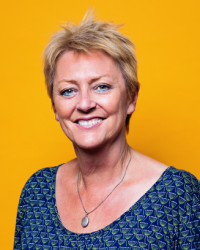Are you happy?
When asked what they want to change when they come to counselling, many people say they just want to be happy. However, when asked how they would know they were happy, most of them are completely stumped. Happiness seems to be something people become aware of in retrospect, often filtering out the more stressful and unhappy aspects of the experience.

Happiness and sadness are emotional extremes, so they’re usually exceptional in that we don’t usually experience them all the time. Mostly, we might describe an acceptable state as 'contentment', where we don’t have too many highs or lows but jog along comfortably. And when people say, for instance, that they were happy living in Manchester, they don’t mean every moment was delightful, but that it suited them overall.
When other people seem happier than we do
It’s easy to imagine that everyone we know is happier than we are. You might meet many people who seem happy, but we can’t know whether they’re putting on a front and believe that showing negative emotion is unacceptable. They may even believe you seem happier than they do.
I once knew someone - Bob - who was always asking people whether they were happy. Many found this a bit irritating, assuming he wanted this reassurance so that he wouldn’t have to worry about them or engage with their distress. Whatever the reason, everyone just told him they were happy in the hope he would stop asking. Then one day I decided to answer that I wasn’t happy. A close friend had just died and I felt the question was insensitive. "Really?!", Bob exclaimed, "how do you cope?". All this time, he had just wanted help with his feelings, beating himself up because he couldn’t reach the dizzy heights of happiness that others seemed to achieve, and being unable to recognise that others weren’t always happy at all.
Highs and lows
In an average day, most of us experience highs and lows. We expect our mood to change, or be changed by circumstances, and might well recall a 'happy' occasion which contained some challenges. But there are a few people who wouldn’t describe many occasions as happy, because they think they should be completely delightful, with no glitches or moments of boredom at all. Indeed, for some people, annoyance with themselves for not being completely happy when they feel they should and want to be is much worse than the not-happy feelings they have. Recognising that it’s normal to have ups and downs and that this doesn’t disqualify overall happy or contented feelings, is all that’s often needed to improve mood.
Extremes
However, when someone is exceptionally stressed or distressed, they can feel constantly anxious at one extreme or low and numb at the other. It’s understandable to believe that you’re never relaxed or even that you never feel at all. Noticing what’s happening in your body more, and scanning from top to toe several times a day, can help you become aware that you are experiencing a variety of bodily sensations which signify a range of different emotions.
Just changing the position of your body can alter the way you feel. If you’re tensed up, try dropping your shoulders and taking some long deep breaths in and out; this will slow your pulse and allow you to relax a little. When you’re feeling low, sit up straight and tall, open your hands, and lookup. You’re likely to feel a little better straight away.
Counselling can be helpful if you feel stuck and find it difficult to change your mood. But try not to blame yourself for not being happy all the time - you are not alone.

Find a therapist dealing with Anxiety
All therapists are verified professionals






